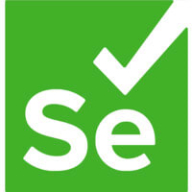

Selenium HQ and Telerik Test Studio are competing in the web application testing category. Selenium HQ has the upper hand due to its open-source flexibility, wide programming language support, and browser compatibility.
Features: Selenium HQ provides automation capabilities via WebDriver integrating with various programming languages and platforms. It offers cross-browser support and a scalable remote execution platform, which is ideal for distributed testing environments. Telerik Test Studio features a visual test recording system, seamless integration with Telerik products, and comprehensive test management options, appealing to teams seeking a cohesive testing environment.
Room for Improvement: Selenium HQ can be challenging for non-technical users due to its steep learning curve and dependency on code for automation scripts. Additionally, its reliance on community support can limit immediate help. Telerik Test Studio could benefit from broader language support and increased extensibility for advanced customizations. It also lacks the widespread community-driven resources that can provide diverse troubleshooting perspectives.
Ease of Deployment and Customer Service: Selenium HQ requires self-paced deployment and community-driven support, which can be a hurdle for less technical teams. In contrast, Telerik Test Studio offers streamlined deployment with extensive technical support, detailed documentation, and guided assistance, making it suitable for teams needing structured support and ease during setup.
Pricing and ROI: Selenium HQ is a cost-effective tool since it is open-source and incurs no initial costs, although this may be offset by the time investment required for setup and maintenance. Telerik Test Studio, while having a higher upfront cost, provides quick setup and reduced execution time, resulting in potential long-term savings and improved testing efficiency, making it attractive for teams ready to invest for increased productivity.


Selenium HQ is an umbrella project that includes a number of tools and frameworks that allow for web browser automation. In particular, Selenium offers a framework for the W3C WebDriver specification, a platform- and language-neutral coding interface that works with all of the main web browsers.
Selenium is a toolset for automating web browsers that uses the best methods available to remotely control browser instances and simulate a user's interaction with the browser. It enables users to mimic typical end-user actions, such as typing text into forms, choosing options from drop-down menus, checking boxes, and clicking links in documents. Additionally, it offers a wide range of other controls, including mouse movement, arbitrary JavaScript execution, and much more.
Although Selenium HQ is generally used for front-end website testing, it is also a browser user agent library. The interfaces are universal in their use, which enables composition with other libraries to serve your purpose.
The source code for Selenium is accessible under the Apache 2.0 license. The project is made possible by volunteers who have kindly committed hundreds of hours to the development and maintenance of the code.
Selenium HQ Tools
These three main Selenium HQ tools have powerful capabilities:
Reviews from Real Users
Selenium HQ stands out among its competitors for a number of reasons. Two major ones are its driver interface and its speed. PeerSpot users take note of the advantages of these features in their reviews:
Avijit B., an automation tester at a tech services company, writes of the solution, “The driver interface is really useful. When we implement the Selenium driver interface, we can easily navigate through all of the pages and sections of an app, including performing things like clicking, putting through SendKeys, scrolling down, tagging, and all the other actions we need to test for in an application.”
Another PeerSpot reviewer, a software engineer at a financial services firm, notes, “Selenium is the fastest tool compared to other competitors. It can run on any language, like Java, Python, C++, and .NET. So we can test any application on Selenium, whether it's mobile or desktop."
We monitor all Functional Testing Tools reviews to prevent fraudulent reviews and keep review quality high. We do not post reviews by company employees or direct competitors. We validate each review for authenticity via cross-reference with LinkedIn, and personal follow-up with the reviewer when necessary.